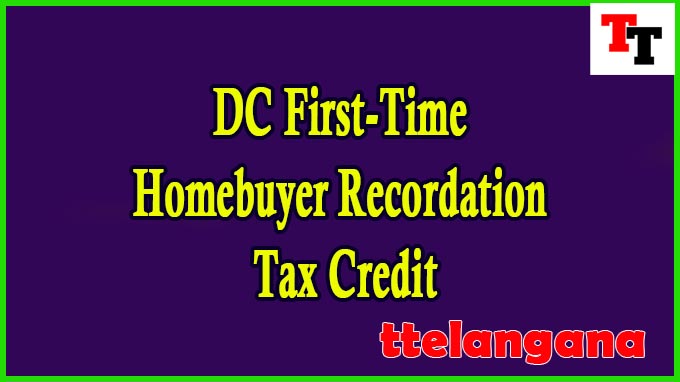The DC First-Time Homebuyer Recordation Tax Credit Empowering Homeownership
The District of Columbia’s First-Time Homebuyer Recordation Tax Credit is a treasured program designed to support individuals and families in achieving homeownership. This initiative affords eligible first-time homebuyers with a tax credit, supporting to relieve the monetary burden related to purchasing a domestic inside the state’s capital. By understanding the intricacies of this tax credit program, potential homebuyers can take gain of the advantages it gives and make informed selections all through their homebuying adventure.
Eligibility Criteria
To qualify for the DC First-Time Homebuyer Recordation Tax Credit, candidates should meet positive eligibility standards.
These criteria generally include:
First-time Homebuyer Status: Applicants must be buying a domestic within the District of Columbia for the primary time. The software defines a first-time homebuyer as an man or woman or household that has now not owned a primary house inside the three years previous to buying a home.
Income Limitations: The tax credit score software often imposes profits obstacles to make sure that assistance is directed towards people who surely need it. Prospective homebuyers ought to meet the income requirements set by way of the program.
Purchase Price Limitations: The program might also impose buy fee limitations, making sure that the tax credit is on the market to individuals and households throughout various profits tiers. These barriers vary and are situation to trade based on contemporary market situations.
Benefits of the Tax Credit
The DC First-Time Homebuyer Recordation Tax Credit gives numerous key advantages that make homeownership more less costly and available.
These advantages consist of:
Financial Relief: One of the number one benefits of this tax credit score is the financial comfort it presents to first-time homebuyers. By reducing the quantity of recordation tax payable at last, the tax credit score lowers the in advance fees related to shopping a domestic. This can significantly ease the monetary pressure on homebuyers and make homeownership a greater plausible purpose.
Increased Purchasing Power: The tax credit score software enhances the purchasing power of first-time homebuyers. With reduced ultimate costs, homebuyers may additionally have extra price range to be had to invest in their new houses or cowl other charges related to the homebuying process. This improved buying power allows homebuyers to make extra informed decisions and potentially stable better financing options.
Long-Term Savings: By minimizing the recordation tax payable at closing, the tax credit score program gives long-term financial savings for first-time homebuyers. These financial savings can be enormous, relying on the purchase price of the house. Homebuyers can make use of those financial savings to invest in home upgrades, pay down their loan essential, or allocate them for different economic desires.
Housing Market Stimulus: The tax credit score also plays a crucial role in stimulating the housing market inside the District of Columbia. By incentivizing first-time homebuyers, this system contributes to increased demand for housing, which, in turn, supports local real estate improvement and financial increase. The ripple effect of this stimulus can definitely impact the general housing marketplace and create a extra vibrant network.
DC First-Time Homebuyer Recordation Tax Credit Empowering Homeownership
Application Process
To avail the DC First-Time Homebuyer Recordation Tax Credit, involved people should follow a particular software system.
While the exact manner may vary slightly, the subsequent steps usually observe:
Obtain Eligibility Certification: Before filing an software for the tax credit score, individuals have to reap a Certificate of Eligibility from the DC Office of Tax and Revenue. This certification verifies the applicant’s eligibility as a primary-time homebuyer and confirms compliance with the program’s standards.
Complete the Application: Once the eligibility certification is acquired, candidates must complete the necessary application forms provided by the DC Office of Tax and Revenue. These paperwork normally require specified records approximately the property being bought, the acquisition fee, and the applicant’s private and financial details.
Submit Required Documentation: Along with the completed utility forms, candidates should put up supporting documentation, which may additionally consist of profits verification, proof of residency, and different relevant documents as distinct by the program.
Await Approval and Credit Calculation: After filing the software and assisting documents, applicants ought to look ahead to the DC Office of Tax and Revenue to study their submission. The office will determine the tax credit amount based totally at the application’s hints and tell the applicant of the authorised credit.
Claim the Credit at Closing: Finally, on the remaining of the house purchase, the tax credit may be claimed. The credit is carried out in the direction of lowering the recordation tax payable, ensuing in instantaneous financial comfort for the homebuyer.
Conclusion
The DC First-Time Homebuyer Recordation Tax Credit performs a important role in selling homeownership and supporting people and families inside the District of Columbia. By assuaging the financial burden associated with purchasing a domestic, the tax credit score application empowers first-time homebuyers and will increase their buying electricity. The advantages of this application increase beyond on the spot financial remedy, presenting long-term financial savings and stimulating the local housing marketplace.
If you are considering shopping your first domestic inside the District of Columbia, it’s far vital to discover the eligibility criteria and alertness procedure for the DC First-Time Homebuyer Recordation Tax Credit. By taking advantage of this precious program, you can make homeownership extra affordable, enhance your purchasing electricity, and contribute to the boom of your community. Consult with the DC Office of Tax and Revenue or a certified actual estate expert to attain the most up-to-date statistics and steering regarding this tax credit application.
